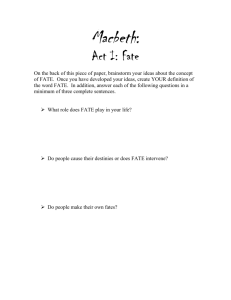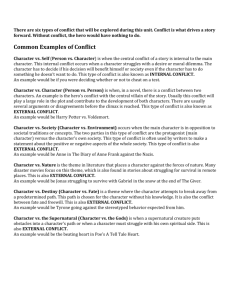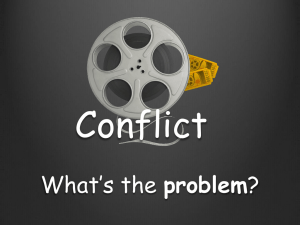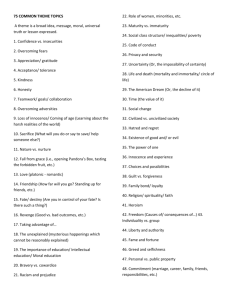WLT day one part one
advertisement
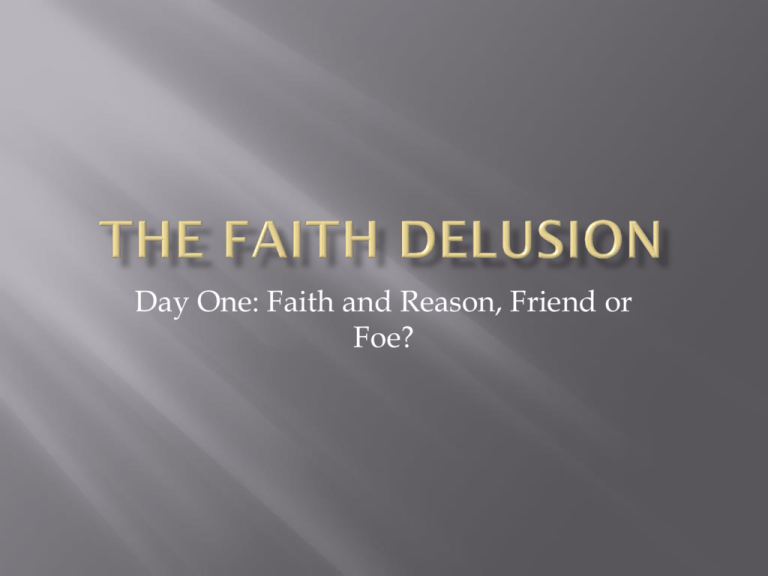
Day One: Faith and Reason, Friend or Foe? Belief in God is something that the unscrupulous use to exploit the credulous. ‘Christians are not prepared either to offer or to accept arguments about their beliefs. They resort to ‘don’t ask questions, just believe’ or ‘your faith will save you… ‘Being clever in life is bad and stupidity is good’. (Celsus – 2nd Century AD critic of Christianity) Richard Dawkins ‘The Selfish Gene’ ‘The Blind Watchmaker’ ‘The God Delusion’ Daniel Dennett ‘Consciousness Explained’ Pascal Boyer ‘Religion Explained’ Stephen Hawking ‘A Brief History of Time’ ‘The Grand Design’ Susan Greenfield (neuroscientist) ‘The Private Life of the Brain’ Iain McGilchrist ‘The Master and his Emissary’ Roger Penrose (Mathematical physicist) ‘The Emperor’s New Mind’ ‘The Road to Reality’ Alister McGrath, Chemist ‘The Dawkins Delusion’ Faith and Reason are against each other. We have revelation Revelation contains the whole truth about everything. The enlightenment is a modern Western phenomenon which is hostile to religion and should be ignored. Humanity was in darkness, enslaved to religion and superstition. Then came freedom of thought, people discovered the truth about the world. We are now set free from religion by science and philosophy to be truly human. The only thing that holds us back is our refusal to think properly and our fear of freedom. Democritus Epicurus Lucretius Plato, Aristotle Stoic, sceptic Philosophers Egyptians Babylonians Sumerians Persians Jews Indians Arabs… Christianity Connections New Atheists Agnostics Christian theists Origen (3rd Century): if it were practically possible for everyone to abandon the concerns of daily life and spend their leisure doing philosophy – then this is indeed the only path we (Christians) should be pursuing. Albert the Great (12th /13th Century): when it comes to theology and morals I’ll read Augustine, but when it comes to science, I’ll read Aristotle and when it comes to medicine, I’ll read Galen. The European Enlightenment – the younger brother of Western Christianity But ‘Enlightenment’ movements are neither modern, nor exclusively Western. They happen when people have the time to start asking hard questions about the world. The Faith tradition to which Christianity belongs has been interacting with different forms of ‘enlightenment’ from the beginning. Common elements in Genesis 1 with more ancient Sumerian and Egyptian myths of creation: water, separation of heaven and earth, making a space between the waters. (Early speculative science). The heavens and the earth: genesis of the Gods in Greek mythology But in the book of Genesis (6th/5th Century BC?) all of these things are created and ordered by the word of the one uncreated God. This is the first important step towards our modern view of the universe, governed by changeless laws of nature. It is also the first step towards the idea of a world with laws that can be known, but without a creator God. Everything has its origin in water (Thales) Everything has its origin in fire (Heracleitus) There is a mind behind the universe (Anaxagoras) Everything changes (Heracleitus) There is a commanding word that runs through the universe (Heracleitus) True reality is changeless (Parmenides) Everything is atoms, there are no gods (Democritus) If you haven’t thought through what life is about, it’s not worth living (Socrates) We understand things when we can give explanations (Aristotle) Ecclesiastes, Ecclesiasticus, Maccabees, Daniel, Wisdom (Enoch) are written in the Greek period. Jewish communities spread throughout Asia Minor (modern Turkey) and Greek-ruled Egypt. The Hebrew Bible is translated into Greek (Septuagint) using some interesting ‘dynamic’ translation. Jewish Authors write Greek tragedies, histories, philosophy ‘…and when the whole concatenation [of atoms in the body] is dissolved the soul is scattered and no longer has the same powers and it does not move any more, and as a result no longer has any power of perception.’ ‘Grow accustomed to the thought that death means nothing to us, since all that is good and evil is in our perception and death is the absence of perception. But this is the most important thing: if you believe in fate you make advising or reproaching impossible… Wisdom 2.1 ff: (the wicked) who said among themselves…’our life is short and harsh, we have no rescue from death, no one has ever returned from the world below. We were born by chance and afterwards it will be as if we never existed, because the breath of our nostrils is a smoke… our body will be ashes and our spirit will be poured abroad like unresisting air’ The Sadducees do away with fate altogether and remove God beyond not merely the commission, but the very sight of evil. They maintain that man has the free choice of good or evil, and that it rests with each man’s will whether he follows the one or the other. As for the persistence of the soul after death, penalties in the underworld and rewards, they will have none of them. They like to say that after the conflagration everything comes into being again in the order of the universe and is numerically identical. So an individual with a particular quality both is and comes into existence again identical to the previous individual in the other world, as Chrysippus says in ‘Concerning the Universe’ 1 The Pharisees are the Jewish sect closest to the Stoics among the Greek thinkers. 2 The Pharisees, who are considered the most accurate interpreters of the laws, and hold the position of the leading sect, attribute everything to fate and to God; they hold that to act rightly or otherwise rests, indeed, for the most part with men, but that in each action, Fate co-operates. Every soul, they maintain, is imperishable, but the soul of the good alone passes into another body, while the souls of the wicked suffer eternal punishment. ‘The day of the Lord will come like a thief and then the heavens will pass away with a mighty roar and the elements will be dissolved by fire and the earth and everything done on it will be found out…but according to his promise we await a new heavens and a new earth in which righteousness dwells.’ Texts from before the Exile Judgment happens in this life (Amos 1) After death we go to Sheol, a shadow existence or sleep (1 Samuel 28.12 – 19) ‘Does dust give you thanks or declare your faithfulness?’ (Psalm 30). Texts from the 6th Century exile in Babylon and (perhaps) before. The valley of the dry bones (Ezekiel 37) The land of shades gives birth (Isaiah 26.19) A new heavens and a new earth (Isaiah 65.17) Sadducees no fate, no afterlife, Freewill God remote from world Epicureans No fate No afterlife Freewill gods irrelevant to humans Pharisees fate and freewill end of the world in fire New heavens and earth resurrection of the body Stoics fate and freewill end of the world in fire the world cycle begins again reincarnation of souls Daniel 12.2 (2nd Century BC): ‘Many of those who sleep in the dust shall awake and some shall live forever… the wise shall shine brightly like the splendour of the firmament.’ Wisdom 3.7 (1st Century BC) ‘In the time of their visitation the just shall shine and shall dart about as sparks through the stubble.’ The dialogue with other cultures, new science and new thought that asks tough questions changes how we read ancient texts. New sacred texts emerge. Reason becomes revelation. The sabbath is made for humanity, not humanity for the Sabbath. Woe to you lawyers! You lay burdens on people and do not lift a finger to help them. Neither this man nor his parents sinned.

